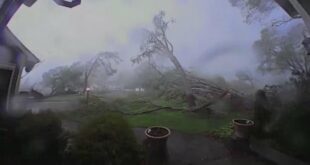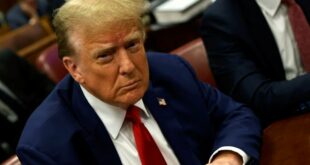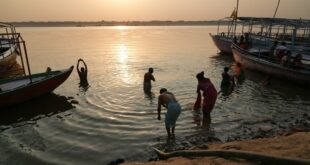Taiwan's Foreign Ministry thanks Canada, in exclusive interview with CBC News
Dressed in camouflage, the armed group moves silently to the doorway — before plunging through an apartment door and opening fire.
Inside the abandoned building in central Taiwan, there are are only paper targets, and the weapons used are low-powered airguns that fire small pellets.
This is the resistance, the civil defenders should Taiwan's army be overwhelmed in the face of attack by China, which wants to reunite the mainland with the self-governing island.
"We won't surrender," says one of the masked men. "Anyone who invades will face us, and we'll use whatever we can to resist."
He asked CBC News not to name him publicly, because he fears Chinese intelligence would target him in a cyber manhunt, leading to harassment of him and his family online.

The Taiwan Hemlock Civil Defence group, which conducts regular training, is one of many organizations in Taiwan preparing for an invasion they are certain will come.
Taiwan has its own armed forces, but it is exponentially smaller than China's.
"We're the backup for our soldiers. If the government needs me, we will support the official military response."
While the group has ballistic vests and helmets, and looks and acts like the military, gun possession in Taiwan is highly restricted. While they are able to practise tactics and shooting accuracy, their current weapons would do little to stop anyone.
After losing a civil war to China's Communist Party in 1949, Taiwan's original authoritarian rulers relocated to the island, instilling an aversion to firearms over fears people might rise up.
Though the island is now a democracy, that reluctance remains today – and many civil defence groups believe that has left Taiwan more vulnerable.

Taiwan has work to do
In an exclusive interview with CBC News, Taiwan's deputy foreign minister acknowledged there are gaps in its defences. Some have been identified as a result of Russia's invasion of Ukraine.
"There's a growing consensus that we Taiwanese people need to defend our country," Roy Chun Lee said. "But compared with Ukraine, I think we still have some room for improvement."
He also points to the unpredictability about whether Beijing might launch an invasion more than seven decades after modern Taiwan came into being. Like Russia, he says, China holds "a worldview that is so different from democratic countries."
While a military attack may (or may not) be on the horizon, economic attacks are already underway, the senior official says.
In just the latest examples, China's Communist Party has banned imports of some of Taiwan's pineapple and seafood products to the mainland, devastating those sectors of the economy.
The timing is suspicious, says Lee, and timed to exert pressure as a presidential election campaign unfolds on the island, one which pits the governing pro-independence party against its opposition, which favours more cordial relations with Beijing.

The message, says Lee, is clear.
"That is, if you work with China, Taiwan probably will face less risk and confrontation. But if you are choosing a candidate that is not in line with China's position, you should be careful about the economic consequences."
The deputy minister points to Beijing's relationship with Ottawa when Canada arrested Chinese citizen Meng Wanzhou, the chief financial officer of Huawei. Soon after, Chinese officials detained two Canadian citizens in China, Michael Kovrig and Michael Spavor. It also imposed economic duties, banning certain Canadian imports.
Also, China is accused of interfering in the most recent Canadian election.
"Canada is a victim of China's large-scale disinformation campaign", Lee argues. "This collective warfare is already part of Taiwan's daily lives."

China has never targeted Taiwan's biggest export for any kind of sanction: The territory is the largest supplier of semiconductors in the world, the sophisticated microchips used to power phones, cars, electronics and much more.
"It is quite unlikely for the time being that China will weaponize its import of semiconductor on Taiwan because that will create an even larger economic impact on the Chinese economy than Taiwan's."
Lee also thanked Canada for its recent decision to sail a Canadian navy frigate through the Taiwan Strait, a body of water which Beijing claims it owns, while Canada and others argue it is international waters. Chinese warships flanked the Canadian vessel for the entirety of the day-long transit.

Beaches could become battlegrounds
Every Chinese leader since 1949 has said they have a military plan to reunite China and Taiwan, but there is no certainty China will ever invade.
If it does, U.S. President Joe Biden has repeatedly said the United States military would intervene.
But Taiwan would possibly — during the first days — need to withstand an assault while the responding military force assembles.
One of the first points of contact is expected to be the beach in Wazihwei, immediately outside the capital Taipei, where China may try to land thousands of troops from ships across the Taiwan Strait.
"We think that the CCP will invade through this beach," said Li-Shih Lu, a retired Taiwan navy lieutenant-commander. "If they control this area, they could easily get into the capital, the presidential office, and also military command centre. If these key sites are captured, we would be seriously impacted."

A military outpost near the beach now contains gun nests, with the potential to deploy barriers on to the beach, to thwart an easy landing for small vessels.
"We are preparing for war," said Lu. "Next year, we will extend mandatory military service from four months up to one year."
But an assessment by the Center for Strategic and International Studies casts some doubt on Taiwan's preparedness for a war they've anticipated for years.
Mark Cancian, the senior advisor who co-authored the report, says Taiwan must "deploy more mobile anti-ship missiles, build a fully manned and highly capable army and spend less on expensive and vulnerable ships and aircraft."

Civil defence groups — as prepared as they may be — would not be sufficient to counter an overwhelming Chinese invasion force.
Taiwan is being encouraged to build up its own military now to be an effective deterrent.
The defender from the Taiwan Hemlock group says the country needs to face the urgency.
"The threat from China is more serious now than it has been before," he told CBC News. "We want to be prepared."
It's why they continue to drill — and expect the rest of the society to do their part, too.
*****
Credit belongs to : www.cbc.ca
 MaharlikaNews | Canada Leading Online Filipino Newspaper Portal The No. 1 most engaged information website for Filipino – Canadian in Canada. MaharlikaNews.com received almost a quarter a million visitors in 2020.
MaharlikaNews | Canada Leading Online Filipino Newspaper Portal The No. 1 most engaged information website for Filipino – Canadian in Canada. MaharlikaNews.com received almost a quarter a million visitors in 2020.







